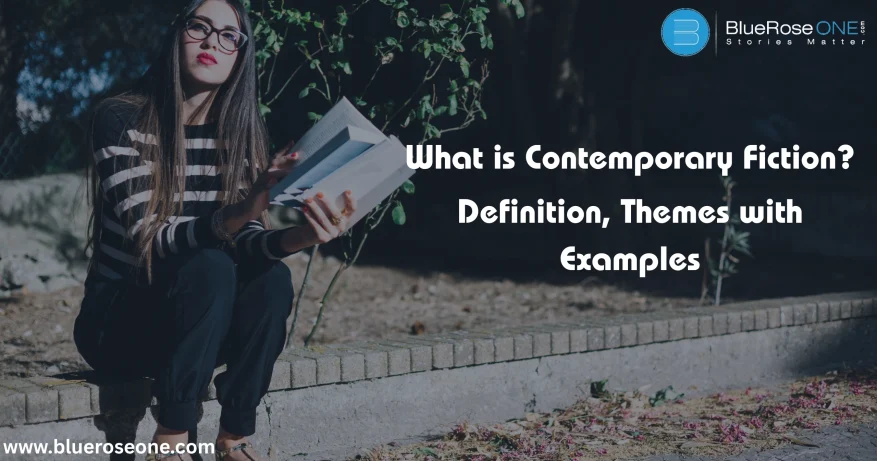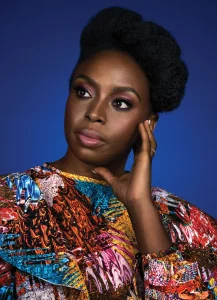Ever read a book and thought, Wow, this could literally happen to me? That’s the magic of contemporary fiction. It mirrors our lives, our struggles, our love stories, and even our awkward text message exchanges.
Let’s dig into what makes this genre a reader’s favorite and why it’s more relevant now than ever.
Contents
- What is Contemporary Fiction?
- Key Characteristics of Contemporary Fiction
- Common Themes in Contemporary Fiction
- Difference Between Contemporary and Literary Fiction
- Benefits of Reading Contemporary Fiction
- Top Contemporary Fiction Authors
- Must-Read Contemporary Fiction Novels
- How to Write Contemporary Fiction
- Who Should Read Contemporary Fiction?
- Conclusion
What is Contemporary Fiction?
Contemporary fiction is literature set in the present or recent past that depicts modern culture, issues, and experiences. Unlike historical or speculative literature, it emphasizes realistic individuals and contemporary concerns.
This genre frequently delves into subjects such as identity, relationships, technology, and social change, giving readers insight into the intricacies of modern life.
Key Characteristics of Contemporary Fiction
Realistic Settings
Contemporary fiction is based on realistic situations that reflect the present world. These settings in urban cities, small towns, schools, or workplaces are familiar and relevant, allowing readers to engage with the narrative.
Authors increase authenticity and immerse readers in real-life events by placing characters in recognized settings, making the narrative more effective and emotionally engaging.
Modern Conflicts and Issues
Contemporary literature frequently delves into contemporary conflicts and important societal concerns including climate change, racial injustice, gender identity, political polarization, and mental health. These stories represent the intricacies of today’s society, providing realistic depictions of personal and social challenges. Contemporary fiction encourages readers’ knowledge, empathy, and critical thinking by focusing on current issues.
You may also like: 10 Powerful Synopsis Examples for Every Genre (With Writing Tips)
Complex and Relatable Characters
People with complicated personalities, internal issues, and sincere intentions are common in contemporary fiction. These people stand in for challenges that arise in real life, such as moral uncertainty, relationships, and identity.
They are emotionally relevant because of their flaws and growth, which enables readers to put themselves in the book. Modern audiences may relate to contemporary fiction on an emotional and intimate level because of its rich characterization.
Emphasis on Character Development Over Plot
Deep character development is usually prioritized over intricate plots in contemporary writing. To make their characters relatable and believable, authors highlight their emotional problems, psychological complexity, and feelings.
These stories allow readers to connect with the characters’ travels on a more intimate and reflective level by emphasizing relationships and personal growth rather than relying on dramatic surprises.
You may also read: 10 Different Types of Poetry Every Literature Lover Should Know
You may also like: Best Stephen King Novels for First-Time Readers

Common Themes in Contemporary Fiction
Identity and Self-Discovery
A prominent theme in contemporary fiction, identity and self-discovery explores characters’ journeys to understand themselves in a complex, ever-changing world. These stories often delve into personal growth, cultural identity, and internal conflict, reflecting modern struggles with belonging and authenticity.
Through introspection and experience, protagonists redefine who they are, mirroring real-world quests for meaning and purpose.
Social Justice and Cultural Tensions
Contemporary fiction often explores themes of social justice and cultural tensions, reflecting current societal struggles such as racism, gender inequality, immigration, and systemic oppression.
These narratives give voice to marginalized communities and challenge readers to confront uncomfortable truths. By weaving personal stories with broader societal issues, authors create powerful commentary on the complexities of identity, belonging, and human rights.
Relationships and Emotional Journeys
In contemporary fiction, relationships often drive the emotional core of the story, exploring complex dynamics between family, friends, and lovers. These narratives delve into personal growth, conflict, and healing, reflecting real-life emotional journeys.
Through authentic portrayals, contemporary fiction captures how connections shape identity and influence characters’ decisions, making emotional depth a key theme in modern storytelling.
You may also like: Jayne Anne Phillips: Life, Books and Literary Legacy
Technology and Modern Life
Technology frequently influences the lives of characters and the dynamics of society in modern fiction, reflecting both advancements and difficulties. Themes like privacy, digital connections, and the influence of social media on identity are all explored in stories.
This topic emphasizes the ways in which technology affects interpersonal relationships, mental health, and moral quandaries, making it an essential lens through which to see the complexity of contemporary life in fiction.
Mental Health and Personal Struggles
Contemporary fiction often explores mental health and personal struggles, reflecting society’s growing awareness of these issues. Characters face challenges like anxiety, depression, trauma, and identity crises, offering readers insight and empathy.
This theme adds emotional depth and realism, helping destigmatize mental illness while highlighting the complexity of human experience in modern life.
You may also like: What Makes BookTok So Popular? Inside the TikTok Book Craze
Differences Between Contemporary and Literary Fiction
Audience and Purpose
Contemporary fiction often targets a broad, mainstream audience, aiming to entertain while reflecting current social realities. In contrast, literary fiction typically appeals to readers seeking deeper thematic exploration and artistic style, focusing on complex character development and philosophical questions.
The purpose of literary fiction is more about provoking thought and emotional insight, whereas contemporary fiction prioritizes relatability and timely issues.
Style and Subject Matter
Modern fiction frequently combines simple storytelling and approachable language to address contemporary societal issues and everyday living. Literary fiction, on the other hand, typically employs a more artistic, subtle style to delve deeper into philosophical subjects and complex human emotions.
Literary fiction places a higher value on reflection and creative style than contemporary literature, which stresses relevance and immediacy.
You may also like: Who Was Emily Post? A Look at the Queen of Etiquette
Benefits of Reading Contemporary Fiction
Builds Empathy and Understanding
Reading contemporary fiction allows readers to step into the lives and experiences of diverse characters, fostering empathy and deeper understanding. By exploring modern social issues, cultural conflicts, and personal struggles, these stories encourage readers to see the world through different perspectives.
This emotional connection helps bridge gaps between people, promoting compassion and awareness in today’s complex society.
Sparks Conversations About Society
Current social themes are frequently explored in contemporary fiction, inspiring readers to consider issues such as identity, inequality, and cultural change.
It creates empathy and awareness in readers by introducing a range of viewpoints and likable characters, which leads to deep conversations about the issues and ideals of society. In daily life, this conversation can stimulate critical thinking and social interaction.
You may also like: Scary Stories to Tell in the Dark: A Complete Guide
Keeps You Emotionally Engaged
Reading contemporary fiction immerses you in realistic characters and relatable situations, making it easier to connect emotionally.
These stories often explore modern issues and complex relationships, allowing readers to experience a wide range of feelings. This emotional engagement enhances empathy, deepens understanding, and creates a more meaningful reading experience.
You may also like: Kendrick Lamar Pulitzer Prize: A Milestone for Hip-Hop Culture
Top Contemporary Fiction Authors
Must-Read Contemporary Fiction Novels

Normal People by Sally Rooney
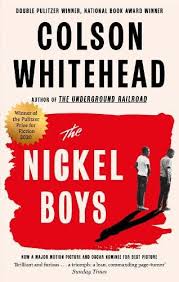
The Nickle Boys by Colson Whitehead
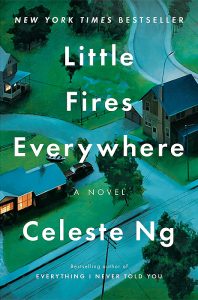
Litlle Fires Everywhere by Celeste Ng
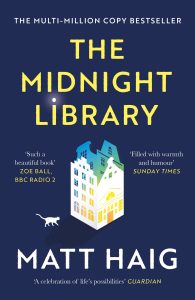
The Midnight Library by Matt Haig
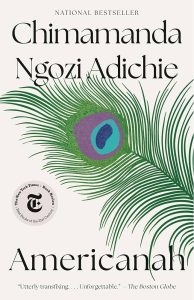
Americanah by Chimamanda Ngozi Adichie
How to Write Contemporary Fiction
Start with a Real-World Problem
Modern literature frequently strikes a chord by addressing topics that readers can identify with, like identity problems, social justice, and climate change. A pertinent problem at the beginning of your story helps to anchor it in current events and gives the characters’ experiences greater realism and interest.
This method engages readers both academically and emotionally while assisting in the exploration of the intricacies of modern life.
Develop Relatable Characters
To create relatable characters in modern fiction, concentrate on realistic individuals with genuine emotions, weaknesses, and motivations. Show their hardships and growth in ways that readers can relate to, reflecting current social issues and daily lives. This connection encourages readers to participate emotionally, making the story more dramatic and convincing in a contemporary setting.
You may also like: Best Classic American Literature Short Stories You Must Read
Keep It Grounded and Honest
Contemporary fiction thrives on true, relatable characters and realistic events that mirror today’s society. To interest readers, writers should write about honest feelings and ordinary challenges without embellishment.
Stories that are grounded on real-life experiences, whether they are about social challenges, personal struggles, or cultural nuances, build a genuine connection with modern audiences.
You may also like: 100+ Adjectives That Start with C (With Definitions & Examples)
Who Should Read Contemporary Fiction?
For Readers Who Crave Realism
Contemporary fiction is ideal for those who want stories that are founded in reality and address current societal issues. It represents authentic human experiences, emotions, and varied views, frequently delving into ordinary issues and relationships.
If you appreciate stories that reflect the intricacies of the current world without using fanciful aspects, contemporary fiction provides relevant and thought-provoking reads.
For Those Exploring Identity or Culture
For people interested in identity or culture, modern fiction provides complex, nuanced storylines that represent varied lives and societal realities. It explores themes of self-discovery, cultural history, and the complexity of belonging, giving readers with genuine voices and viewpoints.
This genre promotes empathy and compassion, making it excellent for anyone who wants to better understand oneself or others in today’s globalized society.
You may also read: Best Classic American Literature Short Stories You Must Read
Conclusion
Contemporary fiction is more than just stories set in modern times. It’s a mirror that reflects our lives, struggles, hopes, and identities. It connects people across cultures and helps us understand each other a little better. Whether you’re reading it for escapism or insight, contemporary fiction always has something meaningful to offer.
Frequently Asked Questions
A book qualifies as contemporary fiction if it’s set in modern times and deals with current themes or realistic scenarios.

